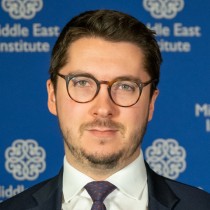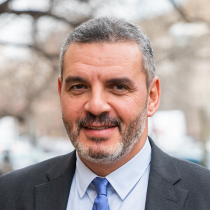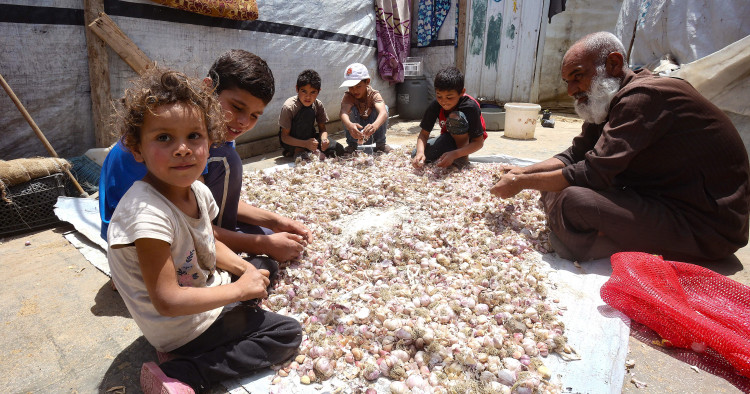Contents:
- Syria’s 12 million displaced face greater uncertainty and terror than ever before
- Mr. Abbas goes to Beijing
- Turkish authorities again turn to the courts to weaken the opposition
Syria’s 12 million displaced face greater uncertainty and terror than ever before
Charles Lister
Senior Fellow, Director of Syria and Countering Terrorism & Extremism programs

-
Only 1% of the millions of Syrian refugees outside the country are willing to consider returning to Assad’s Syria; yet a majority of Middle Eastern governments are in the midst of virtually unconditionally normalizing Assad’s regime, whilst calling for massed refugee returns.
-
The rate of illegal Syrian migration into Europe, particularly since the catastrophic February 2023 earthquake, has increased 150% compared to 2021.
On June 14, Europe witnessed one of its deadliest shipwrecks on record, when a migrant boat carrying approximately 750 men, women, and children capsized and sank off the coast of Greece. Six days later, only 104 survivors have been rescued, all of them men. The hundreds of women and children onboard all perished, trapped in a sub-level compartment. According to reporting, the migrants originated from Syria, Egypt, Afghanistan, and Pakistan, with a substantial majority being Syrians. At least 70 were from Syria’s southern Daraa governorate, which was brutally conquered by regime forces in mid-2018 and forced into a “reconciliation” process. That campaign has left the region isolated from state assistance and pervaded by insurgency, criminality, as well as drug and arms smuggling run by regime militias and Hezbollah.
That such an enormous migrant tragedy occurred just days before the marking of global Refugee Week makes this week’s focus on the displaced all the more important. War-torn Syria’s 12 million displaced people — both refugees and internally displaced — exist in a greater sense of uncertainty and terror than ever before. Their situation is doubly tragic. According to polling released by the United Nations High Commissioner for Refugees (UNHCR) office earlier in June, just 1% of Syrian refugees are willing to consider returning to Syria, ruled by Bashar al-Assad. And yet a majority of the Middle East’s governments are in the midst of virtually unconditionally normalizing Assad’s regime, whilst calling for massed refugee returns.
That policy is not simply contradictory in the abstract — it is triggering a profound sense of panic for displaced Syrians. In Lebanon, home to at least a million Syrian refugees, political parties across the spectrum have turned their ire on this vulnerable group, blaming them for all of Lebanon’s domestic troubles — none of which can actually be ascribed to refugees. In Jordan and Turkey, host to a combined total of nearly 4.5 million refugees, government rhetoric continues to discuss the need to achieve large-scale refugee returns to Syria.
In 2022, the rate of illegal Syrian migration into Europe surged by more than 100% compared to 2021. This was before the catastrophic earthquake in February 2023 and prior to this recent wave of normalization of ties with Assad’s regime. According to European officials speaking anonymously last week, that rate has now increased to 150% versus two years ago. As pressure continues to escalate on Syrians displaced by 12 years of the Assad regime’s scorched earth response to opposition — long chacterized by regime loyalists as “Assad, or we burn the country,” but more realistically now described as “Assad, and we burn the country — desperate measures are likely to become the norm. Catastrophes such as the June 14 sinking should ring alarm bells for the international community, not simply prompt statements of concern and a need to “do better.”
Migrants step onto decrepit, overloaded boats out of sheer desperation, because the prospect for a safe life at home no longer exists. Neither the West’s hands-off approach nor the Middle East’s normalizing path are doing anything to resolve the root causes of Syria’s crisis nor the drivers of this country’s otherwise intractable instability. Unless that changes, there will be many more boats and, tragically, more sinkings too.
Follow on Twitter: @Charles_Lister
Mr. Abbas goes to Beijing
Khaled Elgindy
Senior Fellow, Director of Program on Palestine and Palestinian-Israeli Affairs

-
Beijing is unlikely to supplant Washington as chief sponsor of Israeli-Palestinian negotiations any time soon because China lacks influence over Israel and there is currently no peace process to be had.
-
Nevertheless, both Chinese and Palestinian leaders have an interest in playing up Beijing’s potential role, the former to present China as a global alternative to the U.S. and the latter to improve Abbas’s flagging domestic political standing as well as to create a counterweight to the U.S.-Israel special relationship.
Last week’s state visit by Palestinian Authority President Mahmoud Abbas to China could not have gone better for the beleaguered Palestinian leader. In welcoming him, President Xi Jinping reaffirmed China’s support for “the just cause of the Palestinian people to restore their legitimate national rights,” including the creation of an “independent Palestinian state based on the 1967 borders with East Jerusalem as its capital.” Moreover, the two heads of state used the three-day visit to announce the first-ever China-Palestine strategic partnership, offering as-yet-unspecified economic and other benefits. Beijing’s vocal embrace of the Palestinian struggle stands in stark contrast to the relative neglect shown by the United States, the European Union, and even many Arab states, all of which have deprioritized the Palestinian issue. In return, Abbas heaped praise on his Chinese hosts and even endorsed China’s highly repressive policies toward the Muslim Uighur minority, which he claimed have “nothing to do with human rights and are aimed at excising extremism and opposing terrorism and separatism,” echoing official Chinese talking points.
As America continues to scale back its involvement in the Middle East more broadly, and with Russia mired in its war in Ukraine, China has sought to expand its economic and diplomatic footprint in the region, even offering to serve as a mediator between Israelis and Palestinians, which has long been the sole purview of the U.S. Beijing is unlikely to supplant Washington as chief sponsor of Israeli-Palestinian negotiations any time soon, however. First of all, China lacks the kind of influence with both parties — particularly the Israeli side — needed to broker such an agreement, and second of all, there is currently no peace process to be had. Israel’s far-right government, the most extreme in its history, has no incentive to move toward a two-state solution, while the Palestinians lack the capacity to bring one about.
Nevertheless, both Palestinian and Chinese leaders have an interest in playing up Beijing’s potential role. China’s foray into the Israel/Palestine arena — especially coming on the heels of the March 2023 Chinese-sponsored Iran-Saudi normalization deal — is part of the effort to enhance its global standing and to position itself as an alternative to the U.S. in the international arena. For Abbas, the newly minted China-Palestine partnership is a way to shore up his own dismal domestic standing, particularly if it can produce some tangible economic benefits for Palestine’s flagging economy. In geopolitical terms, the possibility of enlisting a superpower sponsor as a strategic counterweight to the U.S.-Israel special relationship is highly enticing for Abbas (or any Palestinian leader). If nothing else, Abbas’s pivot to China is an opportunity to signal his displeasure with the Biden administration and its neglect of the Palestinian issue by making it known that Washington is not the only game in town. Whether or not China will ever play such role, the China-Palestine strategic partnership is but the latest sign that a U.S.-led Palestinian-Israeli peace process is a thing of the past.
Follow on Twitter: @elgindy_
Turkish authorities again turn to the courts to weaken the opposition
Seren Selvin Korkmaz
Non-Resident Scholar

-
Turkey’s opposition figures continue to face politically motivated legal charges, casting a pall over the future of Turkish democracy.
-
The multiplying legal cases against Istanbul Mayor Ekrem İmamoğlu might impede his political career within the CHP and permit the AKP-led government to rid itself of a popular adversary.
Still relishing in his trouncing of the opposition in the May elections, Turkish President Recep Tayyip Erdoğan is now using the announcements of new cabinet ministers to signal potential looming economic and political reforms. At the same time, the country’s opposition figures continue to face politically motivated legal charges, casting a pall over the future of Turkish democracy. The latest high-profile target is again Ekrem İmamoğlu, the popular mayor of Istanbul, who has been freshly indicted based on a report filed by the Ministry of Interior. The accusations against him revolve around alleged fraudulent practices during his tenure as Beylikdüzü mayor, for which the court has requested a three- to seven-year prison sentence. In December 2022, İmamoğlu was sentenced to two years and seven months in prison, along with a ban on further political activities, stemming from his supposed “insulting” remarks directed at members of Turkey’s election board in a November 2019 speech. That case has now reached the Court of Cassation, the highest appellate court. If the ruling is upheld, İmamoğlu would be ousted from his current mayoral position and barred from engaging in politics in Turkey.
The repercussions of these parallel trials are twofold and deeply unsettling for both the Istanbul mayor and the broader opposition movement. First, the possibility of a political ban was a key concern raised by the opposition in their debates over whom to pick to represent them as the unified presidential candidate to go up against Erdoğan. It was feared that İmamoğlu might be banned from competing ahead of the election, thereby posing significant challenges for the opposition. So for this and other reasons, the united opposition selected Kemal Kılıçdaroğlu, the head of the main opposition Republican People’s Party (CHP). The opposition’s electoral failures in both the presidential and parliamentary races, however, have given rise to internal debates within the CHP as to the party’s direction and future leadership. İmamoğlu is seen as a potential alternative to chart a new path for the CHP against the party establishment, and he himself has called for “change.” Yet some party elites fear his political ban will endanger the CHP if he is elected its leader.
Meanwhile, President Erdoğan has swiftly shifted his focus toward winning Istanbul — a city of great symbolic importance in Turkish politics and a key part of his own political history — in the upcoming local elections, scheduled for March 2024. As the opposition grapples with dwindling hope and waning credibility because of last month’s electoral loss and post-election internal wrangling, İmamoğlu still stands as the sole figure perceived as capable of reclaiming Istanbul. Consequently, the legal charges against him can be interpreted as a deliberate attempt, via the judicial system, to manipulate the opposition and eliminate not just Istanbul’s incumbent mayor but also other emerging, formidable actors capable of challenging Erdoğan and his Justice and Development Party (AKP), including the head of the CHP’s Istanbul branch, Canan Kaftancıoğlu — another crucial figure who contributed to her party winning in the city in 2019. Thus, the possibility of political bans might not only impede İmamoğlu’s political career within the CHP but also permit the AKP-led government to rid itself of a popular adversary.
Follow on Twitter: @selvinkorkmaz
Photo by ANWAR AMRO/AFP via Getty Images
The Middle East Institute (MEI) is an independent, non-partisan, non-for-profit, educational organization. It does not engage in advocacy and its scholars’ opinions are their own. MEI welcomes financial donations, but retains sole editorial control over its work and its publications reflect only the authors’ views. For a listing of MEI donors, please click here.













